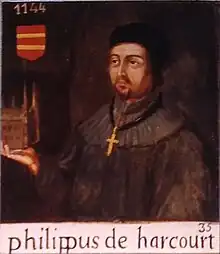Philip de Harcourt
Philip de Harcourt was a medieval Lord Chancellor of England and Bishop of Bayeux. He was unsuccessfully elected as the Bishop of Salisbury.
Philip de Harcourt | |
|---|---|
| Bishop of Bayeux | |
 | |
| Appointed | 1142 |
| Term ended | 1163 |
| Other post(s) | Bishop of Salisbury-elect Dean of Lincoln |
| Personal details | |
| Denomination | Catholic |
| Lord Chancellor | |
| In office 1139–1140 | |
| Monarch | Stephen of England |
| Preceded by | Roger le Poer |
| Succeeded by | Robert of Ghent |
Life
De Harcourt was the son of Robert who was the son of Anschetil, lord of Harcourt, Eure in France.[1] He was the dean of the collegiate church at Beaumont-le-Roger in Normandy by 1131 before being appointed Dean of Lincoln about 1133.[2] During this time he appears to have been made a Prebendary of Aylesbury. He was also archdeacon of Évreux as well.[2] He was Lord Chancellor for King Stephen of England from 1139 to 1140, resigning probably in March.[3] Philip was a partisan of Waleran, Count of Meulan.[2]
In March 1140 de Harcourt was nominated to the Bishopric of Salisbury but the election was quashed in 1141.[4][5] He was nominated by King Stephen with the advice of Waleran of Melun, but Philip's election was opposed by Henry of Blois, bishop of Winchester who was also the papal legate in England and Stephen's brother. Philip appealed to Pope Innocent II but was refused.[1]
In 1142 de Harcourt was named Bishop of Bayeux, an office he held until 1163.[3][5]
Citations
- British History Online Bishops of Salisbury Archived 19 July 2011 at the Wayback Machine accessed on 30 October 2007
- British History Online Deans of Lincoln accessed on 30 October 2007
- Fryde, et al. Handbook of British Chronology p. 82
- Fryde, et al. Handbook of British Chronology p. 270
- Spear "Norman Empire" Journal of British Studies p. 2
References
- Fryde, E. B.; Greenway, D. E.; Porter, S.; Roy, I. (1996). Handbook of British Chronology (Third revised ed.). Cambridge: Cambridge University Press. ISBN 0-521-56350-X.
- Spear, David S. (1982). "The Norman Empire and the Secular Clergy, 1066–1204". Journal of British Studies. XXI (2): 1–10. doi:10.1086/385787. JSTOR 175531. S2CID 153511298.